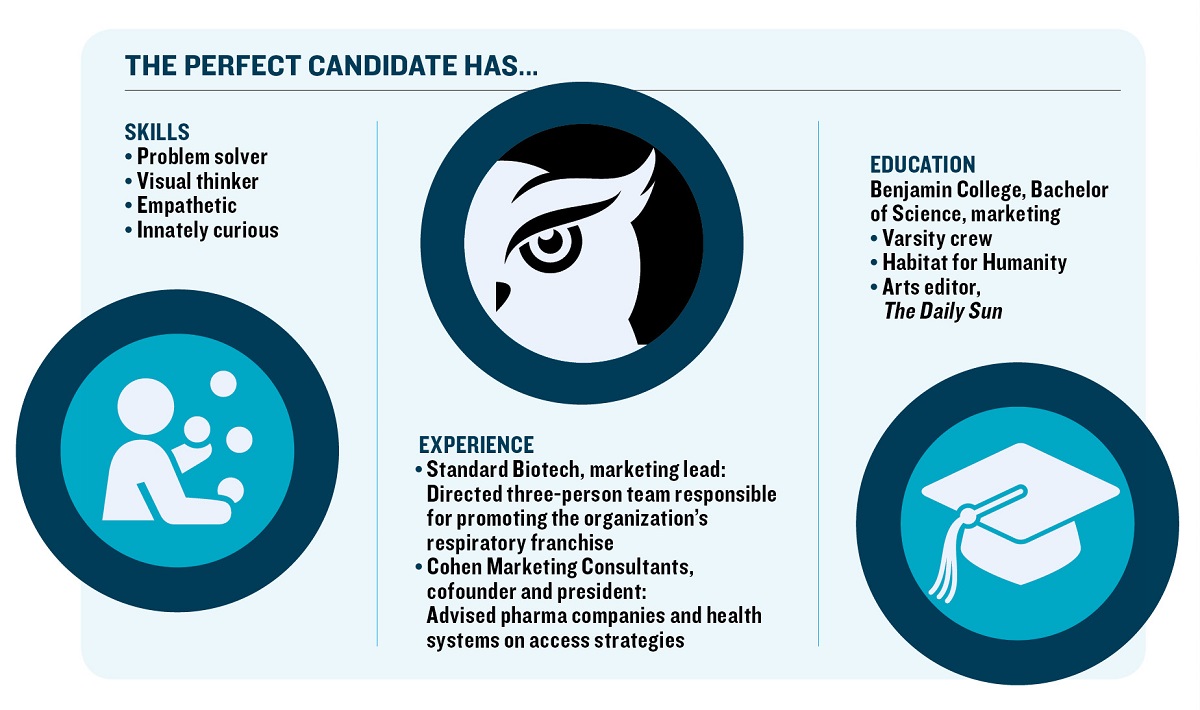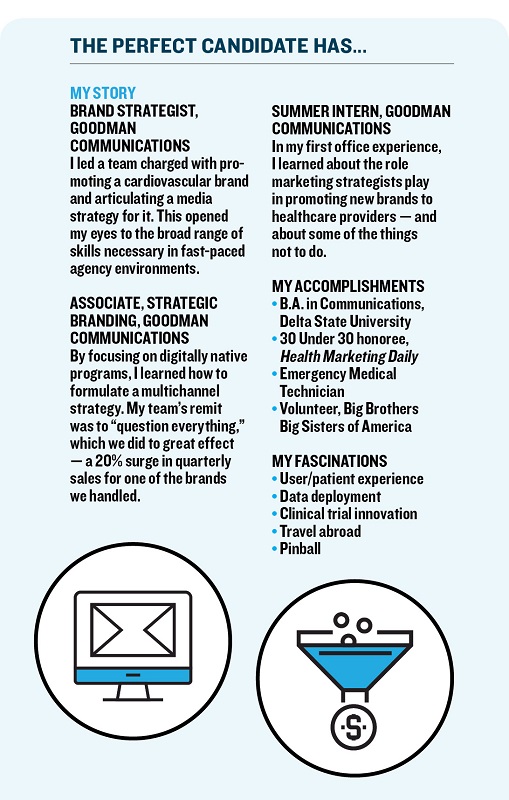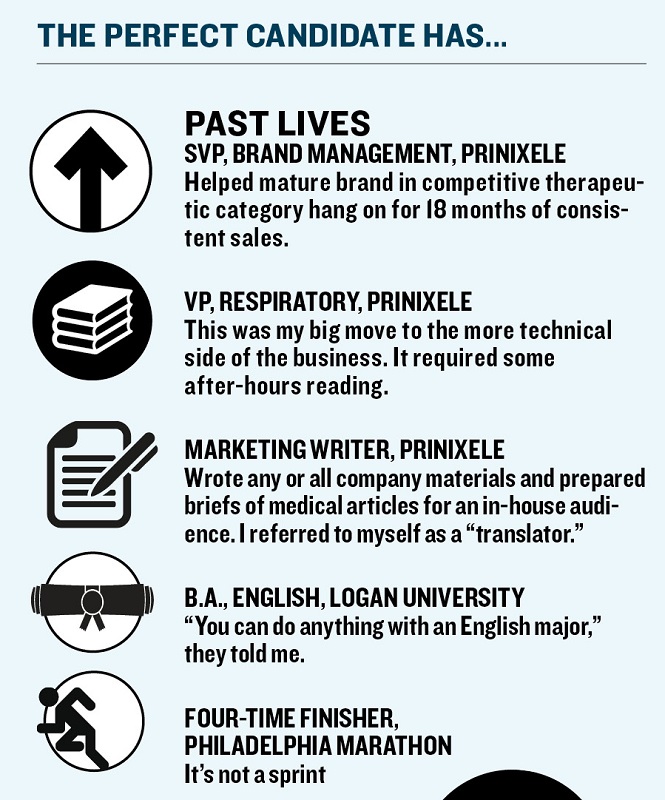Small, midsize, and large agencies differ in their hiring approach. MM&M spoke to each to find what they look for in potential candidates.
Let’s get this out of the way up front: Nobody hires off résumés alone anymore. That said, healthcare-first agencies face an ongoing challenge to find A-grade talent among the plethora of job applicants. We asked HR experts at firms of all sizes what the perfect candidate looks like.
What they look for: Small agencies
“When you’re a small agency, every hire is a major hire,” says StoneArch marketing director Sue Katula. That’s reflected in the advice execs from smaller firms — defined, for our purposes, as agencies with 2017 revenue below $15 million — give to would-be applicants. Put succinctly, they want résumés that are heavy on specifics and low on verbal flourishes.
In this case, more can be less — and, in the process, provide a window into the candidate’s mind. Elevate Healthcare cofounder and managing partner Frank Powers prioritizes résumés in which “the applicant actually illustrates their design theory philosophy” in an offering that’s as much infographic as it is traditional résumé.

Talent Insights
“We’re not big fans of the objective or summary statement,” says Katula. “If you’re taking the time to apply for a job, we assume you see it as an opportunity that will help you achieve a professional goal. Save the ‘how’ of that for the cover letter and interview.”
More so than résumés targeting positions at larger agencies, ones sent to smaller firms must evince some leadership ability or an entrepreneurial bent. With only so many people under their roofs, small agencies can’t abide workers who sit around and wait for direction.
“I always look for people who were involved in activities outside of their major in college,” explains Carling Communications group creative director Lacey Christman. “This shows they are willing to do more than the minimum, which will translate into the workplace.”
What they look for: Midsize agencies
Of all the 20 or so agencies polled for this feature, only the midsize ones ($15 million to $50 million in 2017 revenue) suggested applicants need to lighten up. Of course, they didn’t exactly phrase it that way. Rather, they stressed the need for potential staffers to figure out a way to flash a little personality on the page. “Candidates who can successfully convey who they are beyond the standard résumé must-haves of experience, education, and skills are harder to pass up,” notes Nicole Stark, who leads talent acquisition at Precisioneffect.
Which isn’t to say execs in charge of hiring want applicants to dispense with the essentials. Midsize agencies in particular seem wary about being regarded as a way station for individuals who have their sights set on larger firms. Greater Than One U.S. president Kieran Walsh says his company has its eyes peeled for applicants who “have worked with the same agency or perhaps the same client for a few years and aren’t looking for a job, but rather a career.”

Talent Insights
Concentric Health Experience suggested the “my” framing adopted. Using “my story” and “my fascinations” in place of experience and skills or interests, respectively, serves to frame the candidate’s appeal in a more personal context.
In addition to professional honors and personal achievements, applicants could choose to highlight their personalities here, as well. Precisioneffect chief creative officer Deborah Lotterman appreciates “when a résumé has something clever, just a little wink. I had one person that, under accomplishments, listed, ‘I once found a contact lens on a park bench.’ Another stated he spoke French fluently, but only when drunk. They made me laugh and I saw a bit of the person behind the list of blah, blah, blah.”
A Sandbox representative stresses “well-roundedness [is] something that goes beyond advertising and marketing.” Applicants should take that as a cue to include two or three items that veer closer to a hobby than to an interest directly relevant to the position for which they’re applying.
What they look for: Large agencies
Résumés sent to large agencies need to announce a would-be candidate is ready for the big leagues. Alas, they tend to do this less than well: Of the seven $50 million-and-up agencies contacted by MM&M for this component of the story, four responded with meticulously detailed lists of “things that will prompt us to put your résumé in the garbage,” or something similar.
That said, execs noted applicants shouldn’t sweat it too much. “Résumés are the least important part of our hiring process, maybe 10% or less of the weight in decision-making,” says Christian Bauman, president and chief creative officer of H4B Chelsea and H4B Catapult. “I tend to use résumés to weed people out up front.”

Talent Insights
Larger agencies tend not to dwell too much on résumés, so a single categorical grouping can add creative flourishes. “Every person is a ‘passionate leader experienced in motivating cross-functional teams to multidisciplinary victories.’ And you and everyone else worked on Bextra a decade ago,” Bauman quips. “Tell me what you’ve done and why I won’t be wasting an hour bringing you in for an interview.”
Alas, there are some notes that should be hit. W2O’s chief people officer Deborah Hankin suggests candidates “demonstrate how they use data” and highlight startup experience or work abroad. “It would tell us this person can thrive in challenging new environments and isn’t afraid to try things outside their comfort zone.”
“How good at advertising are you if you can’t sell yourself?” Bauman asks rhetorically. Résumés sent to larger agencies need to employ more forceful, confident language than ones sent elsewhere, most big-company leaders and HR people say.
Athletic accomplishments should always be mentioned, whether the individual is seeking a position at a four-person or 400-person firm. “[Athletes] have the endurance, drive, and discipline to go for great,” Hankin notes.
From the October 01, 2018 Issue of MM+M - Medical Marketing and Media








